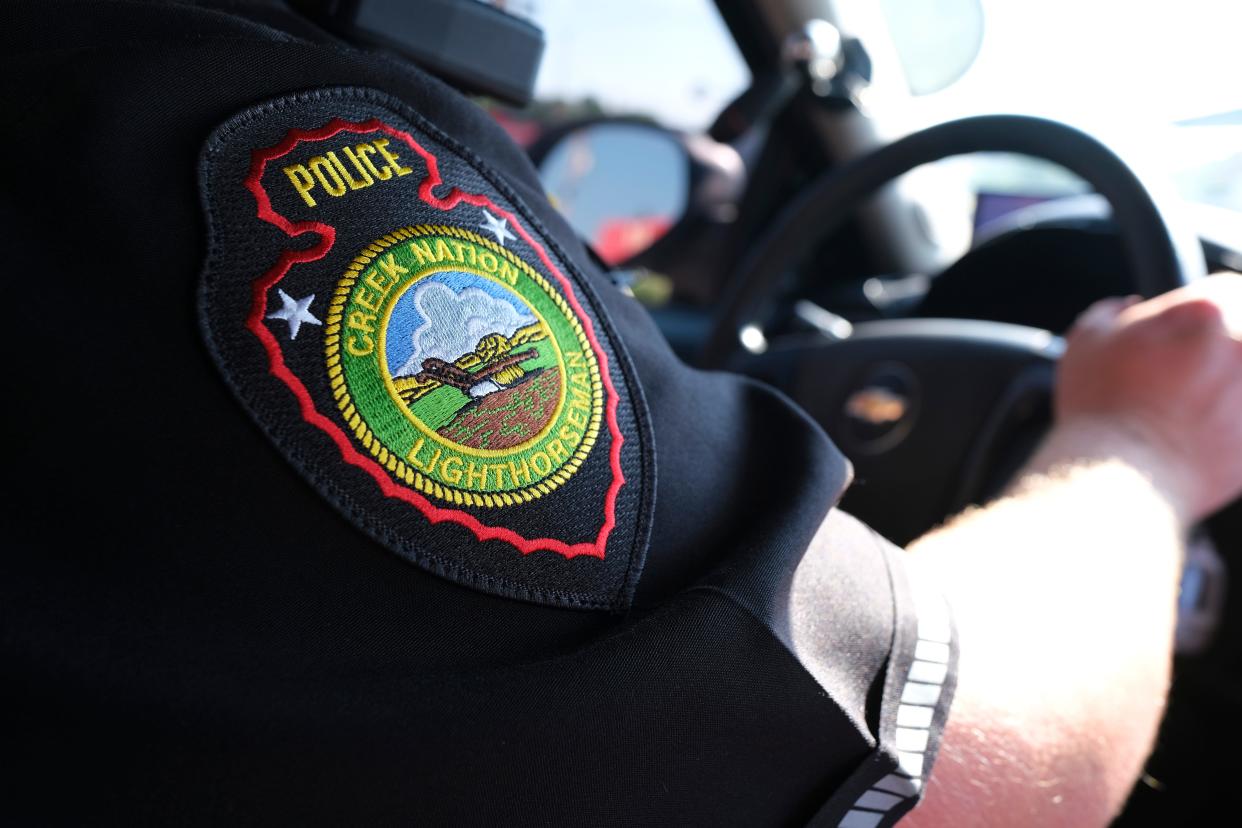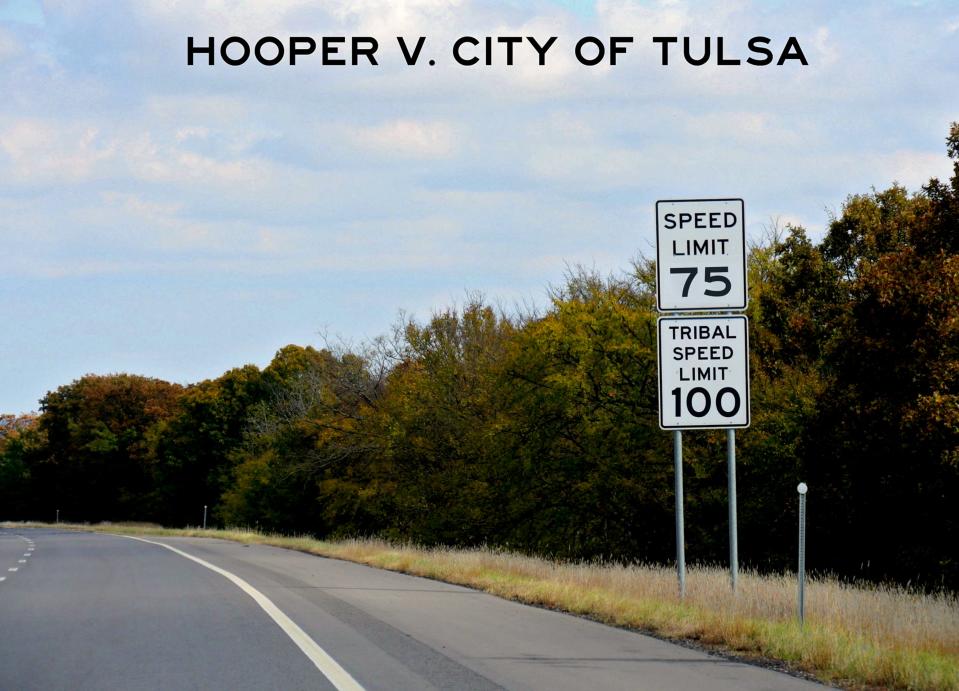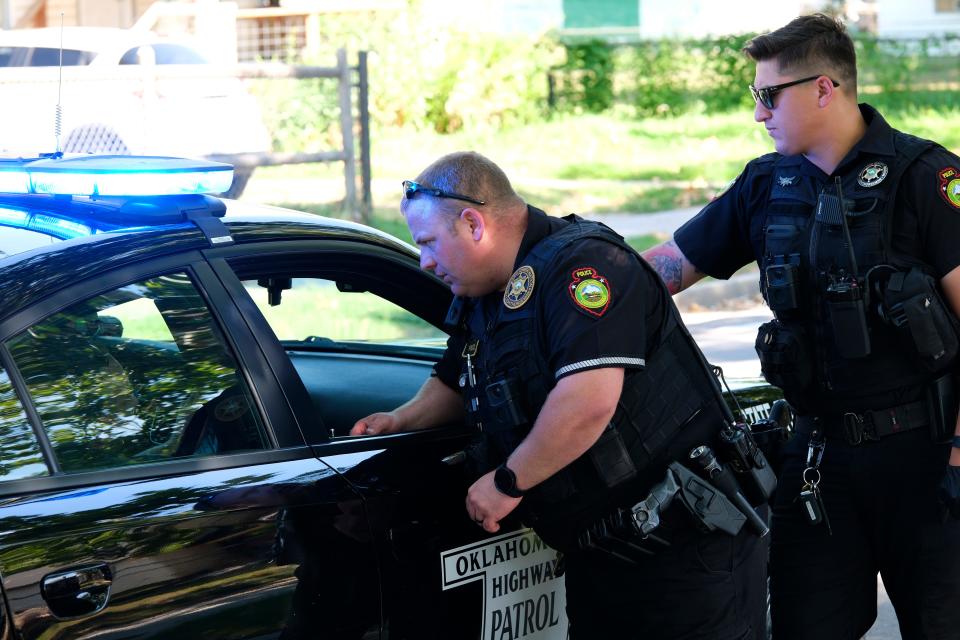The story behind Gov. Stitt's new 'One Oklahoma' video on tribal reservations

- Oops!Something went wrong.Please try again later.
Gov. Kevin Stitt is doubling down on his efforts to limit the expansion of tribal government authority in Oklahoma with a new web page and video.
The first target of his “One Oklahoma” campaign, unveiled late Monday, is a recent federal appeals court decision. A panel of three judges concluded Tulsa cannot prosecute Native Americans for violating city laws on the tribal reservations encompassing the city. The case stemmed from a Choctaw man’s speeding ticket appeal.
Tulsa police still will be able to stop tribal citizens suspected of breaking the law, but then must forward those tickets on to tribal authorities, similar to how most other state and local law enforcement agencies have operated since the Supreme Court ruled in 2020 that the Muscogee reservation still existed. Most of Tulsa sits within the reservation boundaries.
States cannot prosecute tribal citizens on tribal lands. Only federal and tribal courts have that power.
More: McGirt v. Oklahoma, 3 years later: How police work on the Muscogee Nation reservation
Fact-checking Gov. Kevin Stitt's new video
In his video, Stitt casts the Tulsa ruling as creating two sets of laws in Oklahoma, repeating the criticism he has voiced for years about the newly affirmed reservations. He has worried that the state’s power to tax and regulate tribal citizens also could be called into question on the reservations, which cover much of eastern Oklahoma.
In the video, which runs for three minutes and 28 seconds, the governor’s remarks are spliced in with sirens, news clips and comments from a woman wearing an Oklahoma Highway Patrol uniform.
“You know, there are some that believe the rules you follow should be based on your race or your heritage,” Stitt says as he walks through a residential neighborhood. A 25 mph speed limit sign stands over his left shoulder. “And some believe your heritage should also determine the speed you drive on Oklahoma roads.”
The governor is wrong, said lawyer John Dunn, who represented the Choctaw citizen who filed the appeal. The posted speed limit is the posted speed limit, he said. Tribal citizenship only determines what court will enforce the limit if people exceed it, Dunn said.
“What he is doing is spreading misinformation and propaganda in an effort to get people over to his side, which is what people do when they are on the losing side of an argument,” Dunn said.

Geri Wisner, attorney general for the Muscogee Nation, said the tribal government passed a supplemental crimes act that allows her office to prosecute people for violating state laws and city codes even when the tribe does not have a similar crime on its books.
“No one is above the law,” Wisner said. “Speed limits are important, and they will be enforced.”
More: A law pressured tribes to give up land in 1898. It doesn't give Tulsa power today, court rules

Appeal to Supreme Court on Tulsa ruling still pending
Attorneys for the city of Tulsa asked the 10th Circuit Court of Appeals to hold off on enforcing the court's June 28 ruling until U.S. Supreme Court justices decide whether or not to review the case. Judges have not yet ruled on the city’s request, which Dunn filed paperwork to oppose.
Six tribes — the Cherokee, Chickasaw, Choctaw, Muscogee, Quapaw and Seminole nations — also asked the court to deny Tulsa’s request. All of their reservations have been recognized since the 2020 Supreme Court decision. In addition to the Muscogee reservation, the Cherokee reservation also covers part of Tulsa.
In his new video, Stitt describes the Supreme Court review as critical to ensuring the rule of law. “If left unresolved by our nation’s highest court,” he says, “this will have ripple effects across our state.”
One state. One set of laws.
That's what we're fighting for.
Learn more at https://t.co/INH30dXZnr pic.twitter.com/VYlYXkVuNz— Governor Kevin Stitt (@GovStitt) July 17, 2023
Abegail Cave, a spokesperson for Governor Stitt, said he launched the website to highlight the potential fallout of the ruling. "He believes in a unified Oklahoma where all 4 million Oklahomans are created equal and are on an even playing field," Cave said in an email.
She said the video was produced by the governor's office. She did not say whether other videos were planned as part of the campaign.
Stitt shared the video on social media Monday evening. It is also posted to a new page of the state website: oklahoma.gov/oneoklahoma. The page includes the tagline: “One state, one set of laws, one Oklahoma.”
The video ends with the governor pledging to keep Oklahoma united. “In Oklahoma, there should be one set of rules. Period,” Stitt says. “And as your governor, I’m fighting for all Oklahomans, regardless of race or heritage. We can’t let special interests dictate Oklahoma’s future.”
More: Six key moments defining Oklahoma's relationship with Native tribes under Gov. Kevin Stitt
Stitt, a Cherokee Nation citizen, repeatedly has described tribal governments as special interests and their elected officials as casino bosses. The frequency of his remarks increased last fall as he campaigned for a second term. He questioned whether tribes were funding dark money ads against him.
His stance has frustrated tribal leaders, stalling broader government-to-government talks on common concerns such as safety and education. They are also at odds over longstanding deals to split tax money generated from tobacco sales on tribal lands. Stitt rejected the Legislature's attempt to renew the deals through 2024. His new video lands one week before senators plan to vote on overriding his veto.
“I think him portraying us as special interests is a political game,” said Cherokee Nation Principal Chief Chuck Hoskin Jr., speaking about Stitt's messaging. “But I think it also reveals, frankly, his lack of appreciation for tribal sovereignty. And by appreciation, I mean even understanding.”
More: Oklahoma's governor emails tribal leaders offer to extend tobacco tax compacts
Stitt’s new video features a brief audio clip of Hoskin talking about Tulsa recognizing the criminal authority of tribes.
Hoskin and Wisner said Tulsa police already pass along hundreds of reports of felony and misdemeanor crimes to tribal courts; it is city code violations that remain the sticking point.
Operating agreements allow tribal and state police agencies to enforce one other’s laws, which mean they work together on the ground every day, even in Tulsa, Wisner said. “At the end of the day, we all share the same interests of having safe streets and safe neighborhoods,” she said.
Many Oklahoma cities also have worked out agreements with tribal governments to retain a large portion of the fines generated from speeding tickets issued by city officers. Hoskin was driving Tuesday afternoon to Verdigris, northeast of Tulsa, to sign the Cherokee Nation’s 24th such agreement. “This is an example of how government can work,” he said.
More: This long-running lawsuit is the latest dispute over Oklahoma tribal relations
Editor's note: this story has been updated to include comments from Gov. Kevin Stitt's office.
Molly Young covers Indigenous affairs. Reach her at mollyyoung@gannett.com or 405-347-3534.
This article originally appeared on Oklahoman: Gov. Stitt, city of Tulsa work to limit new tribal reservation ruling

